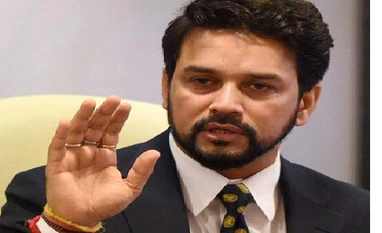The RBI has not asked banks and non-banking financial institutions to raise capital to brace for a possible pile up in bad debt in the coming months, Minister of State for Finance Anurag Thakur informed the Rajya Sabha.
However, he said, "banks and non-banking financial institutions are required to maintain capital as per prudential capital adequacy norms on an ongoing basis."
RBI Governor Shaktikanta Das at an event in July had advised that banks need to raise capital on anticipatory basis to build up adequate capital buffers to mitigate risks arising out of coronavirus outbreak.
"In such a situation, it has become a lot more important that the banks have to improve their governance, sharpen their risk management skills and banks have to raise capital on an anticipatory basis instead of waiting for a situation to arise. Proactively, it is necessary for both public and private sector banks to build up adequate capital buffers," Das had said.
The economic impact of the pandemic - due to lock-down and anticipated post lock-down compression in economic growth - may result in higher non-performing assets and capital erosion of banks, he had said.
A recapitalisation plan for public sector and private banks has, therefore, become necessary, Das added.
The government in the first batch of Supplementary Demands for Grants has sought Parliament nod for Rs 20,000 crore towards recapitalisation of public sector banks during the current fiscal.
More From This Section
With the intent to ease financial stress caused by COVID-19 disruptions and meet the challenges of bad loans, the RBI in August permitted lending institutions to grant concession to eligible borrowers for COVID-19 related stress in personal, Micro Small and Medium Enterprises (MSME) and corporate loans by implementing individual resolution plans in respect of eligible loans.
Resolution plan would include alteration in the rate of interest, sacrifice by lending institution on the amount payable to interest, waiver of penal interest and conversion of accumulated interest into a fresh loan with a deferred payment schedule, Thakur said.
Replying to another question, the minister said the government has implemented a judicious mix of fiscal and monetary policies to mitigate the negative impact of COVID-19 on the economy.
On May 12, 2020, the government announced the Aatmanirbhar Package, a special economic and comprehensive package of more than Rs 20 lakh crore equivalent to 10 per cent of India's GDP with an aim to encourage business, attract investments and strengthen the resolve for 'Make in India'.
On the monetary front, Thakur said, the Reserve Bank of India (RBI) responded with a mix of conventional and unconventional monetary and liquidity measures to mitigate the negative economic fallout of COVID-19.
The policy rates have been significantly reduced and around Rs 9.57 lakh crore or 4.7 per cent of GDP have been injected since February 2020 to enhance the credit flow in the economy, he said.
The RBI has taken several developmental and regulatory policy measures to enhance liquidity support for financial markets and other stakeholders, ease financial stress caused by COVID-19 disruptions while strengthening credit discipline, improve the flow of credit, deepen digital payment systems and facilitate innovations across the financial sector by leveraging on technology, he said.
"It has announced certain regulatory measures wherein, in respect of all term loans (including agricultural term loans, retail and crop loans) outstanding as on March 1, 2020, all regulated lending institutions were permitted to grant a moratorium of six months on payment of all instalments falling due between March 1, 2020 and August 31, 2020." he said.
Subsequently, he said, it has provided a framework to enable the lenders to implement a resolution plan in respect of eligible corporate exposures without change in ownership and personal loans.
)